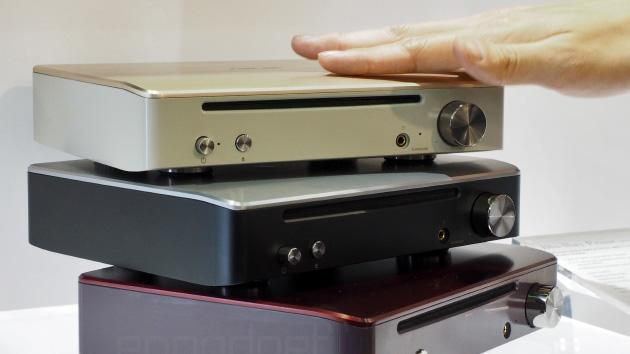CS4398
Latest

ASUS' new external Blu-ray drive does 7.1 audio at a fair price
While ASUS continues to impress us with a slew of PCs and mobile devices at Computex, let's not forget that it still makes some nice peripherals. One thing that surprised us at the ASUS booth was a pretty external Blu-ray drive aimed at audio buffs. Dubbed the Blu-ray Prime, this USB 3.0 device claims to be the "world's only optical drive with 7.1-channel audio output," courtesy of the integrated ASUS Xonar sound card, which packs a Cirrus Logic CS4398 DAC and a C-Media CM6631A audio processor, plus optical output. It also features a 600-ohm headphone amplifier and a clean 114dB signal-to-noise ratio. Expect the Blu-ray Prime to hit various markets for about $199 in Q4, after the DVD version is released in Q3 for half the price. Photos by Zach Honig.

Vivo Xplay boasts 5.7-inch 1080p screen, dedicated audio chips and nifty single-hand mode (video)
Another 1080p quad-core Android phone, you say? Well, there's a bit more to it. Launched by BBK spin-off Vivo in Beijing just now, this 5.7-inch Xplay goes one step further than its smaller X1 and X1S cousins by packing one extra audio chip and the OPA2604 operational amplifier from Texas Instruments in order to add extra oomph to Cirrus Logic's CS4398 DAC and CS8422 stereo asynchronous sample-rate converter -- both of which are featured on the X1 series. If you're a DIY audio enthusiast, you might have already tinkered with an OPA2604 while making your own headphone amplifier; so in other words, Vivo is trying to save you the hassle. Before we dive into the audio performance, let's quickly look at the rest of the phone first. Underneath the 500-nit LTPS display lies a Qualcomm Snapdragon 600 quad-core SoC (1.7GHz, 2GB RAM and Adreno 320 graphics engine), 16GB or 32GB of built-in storage, 3,400mAh battery and NFC. On the back you'll find a Sony 13-megapixel imager next to a pair of speakers (FLAC playback is supported natively), but flip the phone over and you'll be looking at a surprisingly generous 5-megapixel front-facing camera -- much like the one on Oppo's mid-range Ulike 2. Vivo's somehow managed to pack all of this into a 7.99mm-thick body with a screen bezel of just 2.3mm thick (which bests Pantech's thin-bezeled Vega Iron) and a large viewable-to-total area ratio of 75.11 percent. Alas, for 3G there's only WCDMA 2100, meaning the phone may have to rely more on GSM 850/900/1800/1900 or WiFi in many parts of the world. More after the break. Update: Hands-on photos added below, followed by a couple of video clips after the break. %Gallery-187693% %Gallery-187679%

BBK's Vivo X1 is a phone for audiophiles, packs high-end DAC and Beyerdynamic earphones
We've never paid much attention to BBK's phones in the past, but today, this Chinese company -- who's actually the creator of the Oppo brand for the Western market -- announced a rather interesting Android 4.1 device. The idea of this Vivo X1 is that BBK wants to take audio very seriously on its new flagship phone, which is why it's been given a Cirrus Logic CS4398 digital-analog converter plus a CS8422 sample-rate converter -- a combo that's seemingly popular amongst Hi-Fi connoisseurs and manufacturers. And to match that audio performance, BBK's also throwing in a pair of Beyerdynamic MMX 71 iE earphones (20Hz-22kHz, 12Ω, 104dB) as part of the ¥2,498 ($400) package; though you can also choose the AKG K420 or the Sennheiser CX215 instead when buying from BBK's official online store. The rest of the Vivo X1, however, is more bog-standard in comparison: MediaTek MT6577T processor (1.2GHz, dual core, Cortex-A9), 4.7-inch 960 x 540 IPS display, 1GB RAM, 16GB built-in storage, eight-megapixel main camera, 1.3-megapixel front-facing camera and WCDMA 2100 3G radio. The only real highlight here is perhaps the 2,000mAh battery, which is non-removable but still rather impressive considering it's in a 6.55mm-thin body. Even the Oppo Finder has a 6.65mm thickness and yet lacks a 3.5mm headphone jack, whereas BBK's thinner phone has one. What's missing here is microSD expansion, but there's 15GB of Baidu cloud storage should users wish to take advantage of that. The Vivo X1 may just be available for pre-order now, but the folks at BBK couldn't help but tease the highlights of its next-generation device already: bezel-free design, 1080p display, big battery and 13-megapixel camera. We look forward to that.
